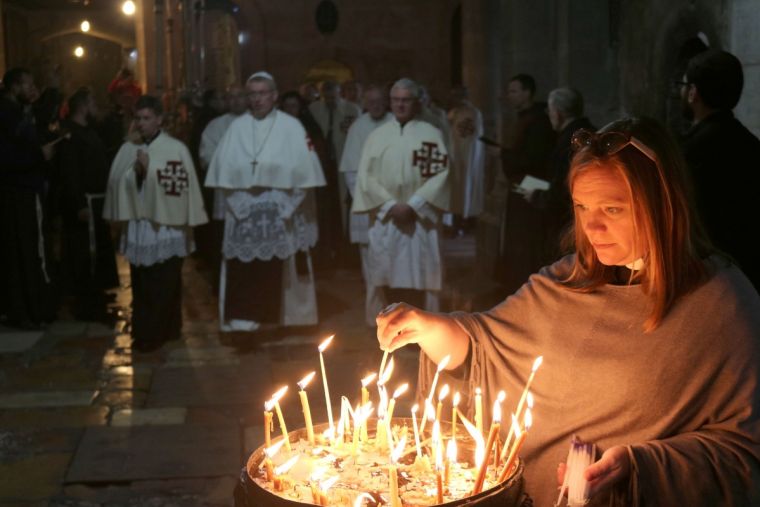Have we got Judas Iscariot wrong? Gogglebox vicar Kate Bottley thinks so...
Poor Judas. All the other apostles are saints, even though some are a little obscure. They have special days on which they're remembered and people have pictures of them and light candles. Not him.
The standard reaction is, "Serve him right." After all, Judas betrayed Jesus. The 'Judas kiss' is a byword for treachery.
However, Rev Kate Bottley has learned to have a good deal more sympathy with him. She's the Anglican vicar who stars in Gogglebox, and on Good Friday she presents an hour-long documentary on BBC 1 entitled In the Footsteps of Judas. It involved her going to Jerusalem and literally travelling the path of the great betrayer – and, she tells Christian Today, it had a huge effect on her. He is not, she discovers, the "pantomime villain" of popular mythology.

"What I found was, everyone I talked to, they did this looking both ways thing, then they'd lean in and say, 'I feel a bit sorry for him really.'"
She admits to having skated over Judas in her ministry so far. "Holy Week is a big week for me. Every night we've done meditations in my churches, but I've never talked about Judas before. We think of him as just black and white, he's the bad guy. We like to think we would be the Mary Magdalene, we like to think we would be Peter who denied Jesus but turned out all right in the end. But actually the tougher question for Christians is, what is there in Judas that reminds me of myself?"
She doesn't minimize what Judas did ("It wasn't OK", she says more than once) but she's fascinated by why he did it. In the programme she looks at what led him to betray Jesus, and finds it more complex than she expected.
"It's too simple to say that it was just for the money. Thirty pieces of silver might have kept him for a couple of months, but it wasn't enough to set him up for life."

Then there's the idea that because "Satan entered into him", it wasn't really his fault. "That doesn't quite wash with me," she says. "There's also the idea that Jesus had let Judas down, that he thought he was a political Messiah who'd lead a revolution, not someone who said love the poor and heal on the Sabbath – the disillusioned disciple not quite getting what he signed up for.
"Each of these explanations didn't quite convince me – but all together, maybe."
However, psychoanalysing Judas isn't really the point. The real story isn't about why he did what he did, but the tragedy of his unforgiveness.
"Jesus had the nails put in his hands on the cross, he said 'Father forgive them', he forgave the very people who were executing him," says Bottley. "So presumably, if Judas had only realised it, forgiveness could have been extended to him too. Judas was not the only one that let Jesus down. He was the worst, but Peter denied him, they all deserted him, there was a shared culpability.
"It wasn't OK, but the black and white narrative of pinning him as the bad guy – that's a little bit too easy."
So rather than being the scapegoat, identified with everything that's too evil for words, Bottley found Judas becoming more of an Everyman.
"Perhaps looking at him again we say, what is the story of betrayal in my own life, where have I let people down, and actually where have I despaired, as well, and said God's forgiveness is not for me?"
Because after all, the overriding message of the story – however he met his end – is that he did not realise forgiveness. "It was not a pleasant end. The story stops with death, not redemption. If he took his own life, he was a young man in the prime of life who sees no other option but to end his life. That's a tragedy."
As part of her journey in Jerusalem – the first time she'd visited the city – she visited Akeldama, the 'Field of Blood' where Judas is said to have fallen and burst open in a grisly fashion.
"It's not on the pilgrim trail," she says. "People don't go and say, 'Let's have a day out and see where Judas hanged himself, they just don't. It's a bit of a bleak, tragic place, really."
There is a monastery there, devoted to St Onouphrius, but it doesn't make much of the Judas connection – significantly, Bottley thinks.
"You have to look really hard to find any evidence of him there. It's much easier to put him in the box that says 'bad guy' rather than put him in the box that says, 'Can I see a little bit of myself in him?' But there's something in the human condition that we are deeply flawed beings and I think Judas holds up a mirror to that."
In the Footsteps of Judas will be broadcast on BBC One on Good Friday, March 25, at 9am.











